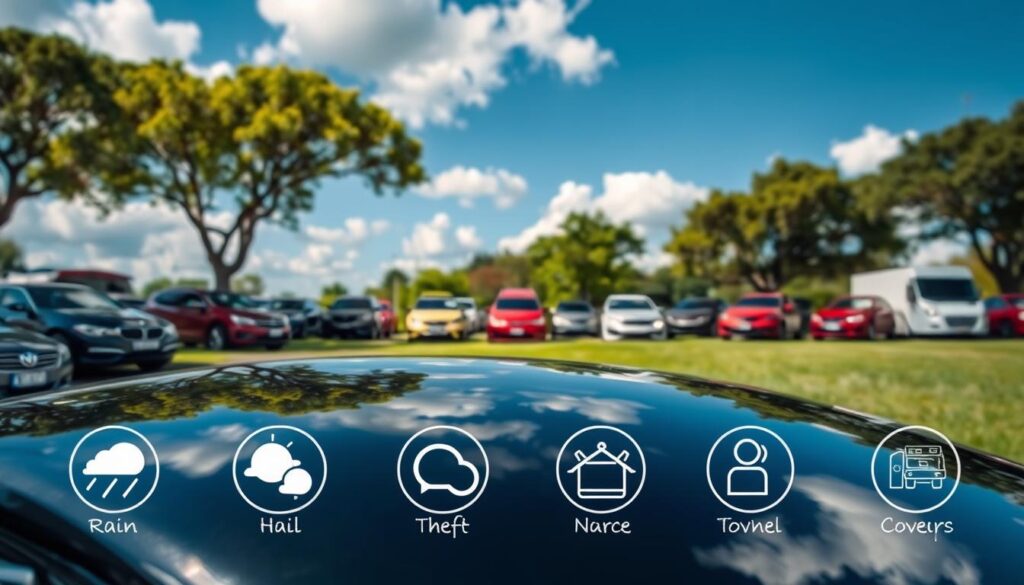Did you know that over $40 billion is paid out for comprehensive car insurance claims each year in the U.S.? This shows how crucial it is to have the right comprehensive car insurance to protect your car and money. Comprehensive insurance goes beyond basic liability, offering a strong safety net. It covers many incidents that could leave drivers at risk.
In this article, we’ll explore comprehensive car insurance in depth. We’ll look at its main parts, how it’s different from other coverages, and the key protection it offers. Whether you’re new to car ownership or just want to check your policy, this guide will help. It will give you the knowledge to make smart choices and ensure you’re well-covered.
Key Takeaways
- Comprehensive car insurance offers more than basic liability, including theft, vandalism, and natural disaster protection.
- It’s different from collision insurance because it covers damage not caused by accidents.
- Comprehensive coverage can save you from expensive repairs and replacement costs.
- Things like your car’s age, where you live, and your driving record can affect comprehensive car insurance costs.
- Knowing the details of your comprehensive car insurance policy is key to getting the right protection.
Understanding the Basics of Comprehensive Car Insurance
Comprehensive car insurance is a key part of a good auto insurance plan. It covers many things beyond just crashes, like theft, vandalism, and natural disasters. Knowing how comprehensive coverage works is important for choosing the right insurance.
Defining Comprehensive Coverage
Comprehensive coverage helps protect your car from damage not caused by a crash. It covers:
- Theft or vandalism
- Damage from natural disasters, such as hail, floods, or earthquakes
- Falling objects, like tree branches or debris
- Collisions with animals, such as deer or other wildlife
Differentiating from Collision Insurance
Comprehensive insurance and collision insurance are both vital but serve different roles. Collision insurance covers crash damages, while comprehensive covers non-crash incidents. Knowing the difference helps you choose the right insurance and premium costs.
Comprehensive coverage and liability insurance together offer strong protection for your car and finances. By understanding deductibles and what comprehensive coverage includes, you can pick the right protection for your needs and budget.
What Comprehensive Car Insurance Covers
Comprehensive car insurance offers more than just basic liability protection. It provides financial security in many situations. Let’s look at what comprehensive car insurance includes:
Uninsured Motorist Coverage: This coverage helps if you’re hit by a driver without insurance. It covers your injuries and car damage costs.
Personal Injury Protection: Known as “no-fault” insurance, it pays for medical bills and lost wages. It’s great if you have high deductibles or limited health insurance.
- Rental Car Reimbursement: If your car is damaged, this coverage pays for a rental car. This ensures you have a way to get around while your car is fixed.
- Roadside Assistance: Comprehensive policies often include roadside help. They assist with flat tires, dead batteries, and other unexpected issues on the road.
- Gap Insurance: This coverage pays the difference between what you owe on your car loan and its actual cash value if it’s totaled in an accident.
Knowing what comprehensive car insurance covers helps you choose the right policy. It ensures you and your vehicle are well-protected.

Conclusion
Comprehensive car insurance is a key protection for drivers. It offers more than basic liability or collision coverage. It gives peace of mind against unexpected events like theft, vandalism, or natural disasters.
This insurance policy covers a wide range of scenarios. It goes beyond standard liability or collision insurance. It helps keep drivers financially stable and safe on the roads.
When looking at insurance options, comprehensive car insurance is a smart choice. It protects your financial future. Knowing its benefits helps you make a choice that fits your needs and prepares you for the road ahead.